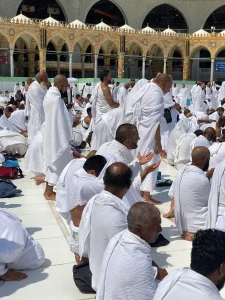THE DIFFERENCE BETWEEN VISITING MAKKAH AND PERFORMING HAJJ

Many Muslims dream of seeing the sacred city of Makkah at least once in their lifetime. The sight of the Ka’bah brings tears to the eyes, peace to the heart, and a feeling of deep connection to the history of Islam and the roots of our faith. But while visiting Makkah is a beautiful and spiritually uplifting experience, it is not the same as performing the Hajj a journey that carries with it a greater depth of purpose, responsibility, and spiritual transformation.
Understanding this difference is not just a matter of ritual detail, but of recognizing the profound gift and obligation that Allah has placed upon us through the act of Hajj.
VISITING MAKKAH A SPIRITUAL HONOR
Visiting Makkah, whether for ‘Umrah or simply to witness the house of Allah, is a blessed act of devotion. A person who visits the sacred city enters a space filled with prayer, history, and the traces of the Prophets and the Companions. You stand before the Ka’bah, walk on the land where revelation descended, and breathe in the presence of a billion prayers made before you.
This visit brings peace, forgiveness, and reward. It renews faith, releases worry, and reminds the heart of its true home: with Allah.
But a visit is often voluntary. It’s a blessing and a choice not a pillar of Islam.
PERFORMING HAJJ A DIVINE COMMAND AND A LIFE-ALTERING JOURNEY
Hajj, on the other hand, is one of the five pillars of Islam a mandatory act of worship upon every Muslim who is physically, mentally, and financially able to perform it. It is not just a visit it is a form of surrender, a reenactment of the prayers, struggles, and sacrifices of Prophet Ibrahim (AS), his son Ismail (AS), and his wife Hajar (RA).
Hajj is not just seeing the Ka’bah it is walking with purpose, with intention, with obedience. It is standing on the plains of Arafat, symbolizing the day when every soul will stand before Allah. It is stoning the pillars that represent Shaytan symbolic of rejecting the whispers of evil that follow us in life. It is sacrificing an animal as a gesture of devotion mirroring the ultimate sacrifice of Ibrahim (AS) when he was willing to give up what he loved most for Allah.
Hajj is not only performed by the body it is performed by the heart.
THE SPIRITUAL DEPTH OF HAJJ
In Hajj, the believer is stripped of status, identity, and worldly markers. The white garments of ihram represent equality kings and workers, scholars and students all stand side by side. It is a reminder of death, resurrection, and the humility that every soul must embrace before meeting its Lord.
While visiting Makkah may bring peace to the soul, Hajj transforms the soul.
A true Hajj ends with forgiveness. A true Hajj reshapes a person’s heart, rewrites their priorities, and reframes their purpose. The Prophet ﷺ said that a sincere Hajj removes sins like a newborn child pure and unstained.
CONCLUSION
To visit Makkah is a gift. But to perform Hajj is a command and a deeply personal encounter with Allah that brings renewal, rebirth, and nearness to Him unlike anything else.
Therefore, as Muslims, we should not only dream of seeing the Ka’bah, but strive to fulfill the obligation of Hajj when Allah grants us the ability. For in that journey lies not just a memory but a transformation that begins here and continues into the next life.
May Allah grant every able Muslim the honor of performing Hajj sincerely and accept it as a means of purification and elevation in this life and the next. Ameen.

